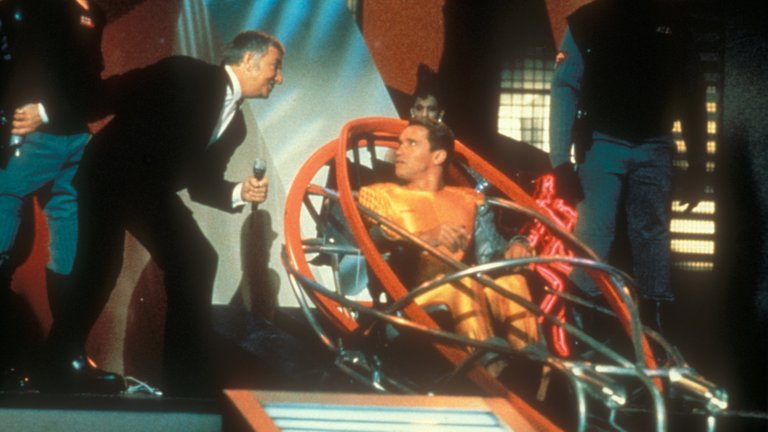Film Review: The Running Man (1987)

One of the saddest recurring jokes on today’s social media is the claim that Orwell’s 1984 was misinterpreted as instruction manual for our world rather than warning about dystopian future. While many tend to find similarities between today’s reality and Orwell’s dystopian vision, there are other works of dystopian fiction that turned out to be more prophetic. One of those is The Running Man, 1987 science fiction action film directed by Paul Michael Glaser.
The film is (rather loosely) based on the eponymous novel by Stephen King, originally published under pen name “Richard Bachman”. The plot begins in 2017, a year when USA is suffering from economic collapse and the government tries to keep impoverished masses in check with combination of brutal repression and spectacular television game shows that feature gladiatorial combat. Protagonist, played by Arnold Schwarzenegger, is Ben Richards, police helicopter pilot who refuses to fire into the crowd of innocent civilians. For his trouble gets arrested, found guilty for actual massacre and sent to penal labour colony. He manages to escape, but is ultimately re-arrested thanks to Amber Mendez (played by Maria Conchita Alonso), television company employee who had been given his brother’s apartment. His escape, however, left a huge impression on Damon Killian (played by Richard Dawson), television company executive and host of “Running Man”, enormously popular game show in which convicts or “runners” have a chance to win freedom if they survive merciless hunt by armed killers known as “stalkers”. Richards very reluctantly agrees to participate only to find out that the game was rigged and he is not supposed to win the contest. He nevertheless proves to be quite resourceful and manages to take out “stalkers” one by one, gradually winning the favour by the audience. At the same time, William Laughlin (played by Yaphet Kotto) and Harold Weiss (played by Marvin J. McIntyre), two of his friends and fellow inmates who belong to resistance movement, want to use the ordeal as an opportunity to sabotage network’s satellite links and bring down government propaganda.
In 2017 many commentators were finding disturbing similarities between the real world and its fictional depiction in The Running Man. Those details included economic woes that ruined entire generations; governments brutally crushing dissent; tasteless reality shows becoming most popular form of entertainment; media cynically manipulating public with censorship, “fake news” and widespread use of technologies nowadays known as Deepfake. Even the beginning of the film has some unpleasant similarities with 2007 event in Baghdad that would ultimately put Julian Assange in so much trouble. For the audience in 1987, depiction of future world was, however, less important than what they really expected of the film – another opportunity to see their favourite action star Arnold Schwarzenegger take out villains in spectacular fashion followed by obligatory humorous one-liners. Scriptwriter Steven E. de Souza dutifully followed such priorities; most of the content in King’s, rather dark and disturbing novel, is replaced with cliches and tropes, including those of Hollywood dystopian films. So, the protagonist gets aid from resistance movement, which is represented by British musician Mick Fleetwood playing a character very much like himself. There is also an obligatory romantic subplot with character of Maria Conchita Alonzo starting as corporate regime supporter only to see the error of her ways and try to do the right thing, falling in love with the protagonist during the process.
The Running Man was obviously not intended to be taken too seriously, but it still leaves something to be desired even as a campy science fiction. Reason for that can be found in poor direction by Paul Michael Glaser. Former actor and star of Starsky and Hutch TV series, had most of his directorial experience on television and he was brought to the set as late replacement. As a result, his work couldn’t have improved much on the film which, despite bloated budget, looked relatively cheap, almost like television production. Glaser maintained good pace and, during the mid-section, there are some serious attempts to give more character to various flamboyant “stalkers” sent to kill the protagonists. They are played mostly by professional wrestlers, but the way they are taken out doesn’t look particularly original. Relatively large amount of time and attention are given to show’s female dancers whose work was choreographed by Paula Abdul. Schwarzenegger is adequate in his underwritten role, while the best role belongs to Richard Dawson, actor and television game show host who in many ways played character very much like his real life television persona. Musical score by Harold Faltermeyer is adequate, although not too memorable. Same thing, at the end of the day, can be said for the film in general. Thanks to Schwarzenegger’s stellar status, it had more than decent box office results and is still appreciated by Schwarzenegger’s fans who will enjoy it whether they take film’s prophetic qualities seriously or not.
RATING: 5/10 (++)
Blog in Croatian https://draxblog.com
Blog in English https://draxreview.wordpress.com/
Leofinance blog https://leofinance.io/@drax.leo
Cent profile https://beta.cent.co/@drax
Minds profile https://www.minds.com/drax_rp_nc
Uptrennd profile https://www.uptrennd.com/user/MTYzNA
Unstoppable Domains: https://unstoppabledomains.com/?ref=3fc23fc42c1b417
Hiveonboard: https://hiveonboard.com?ref=drax
Rising Star game: https://www.risingstargame.com?referrer=drax
1Inch: https://1inch.exchange/#/r/0x83823d8CCB74F828148258BB4457642124b1328e
BTC donations: 1EWxiMiP6iiG9rger3NuUSd6HByaxQWafG
ETH donations: 0xB305F144323b99e6f8b1d66f5D7DE78B498C32A7

https://twitter.com/draxblog/status/1521865317164756994
The rewards earned on this comment will go directly to the person sharing the post on Twitter as long as they are registered with @poshtoken. Sign up at https://hiveposh.com.